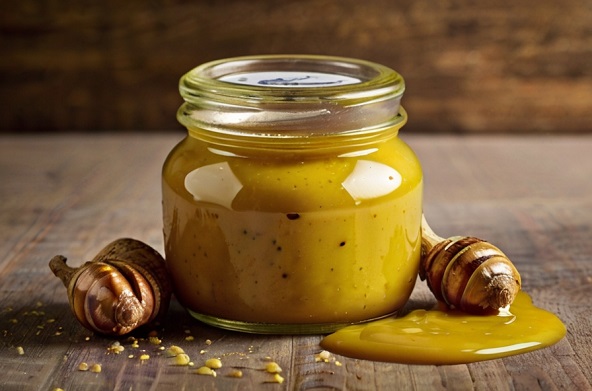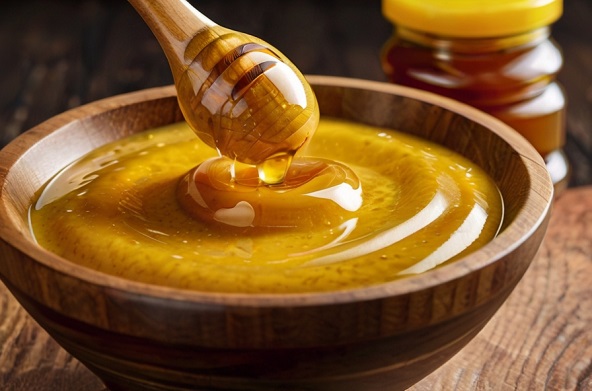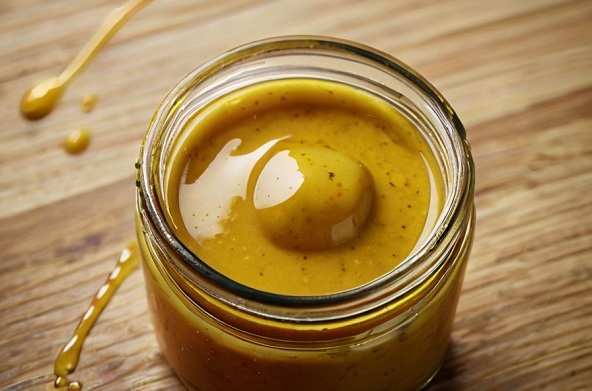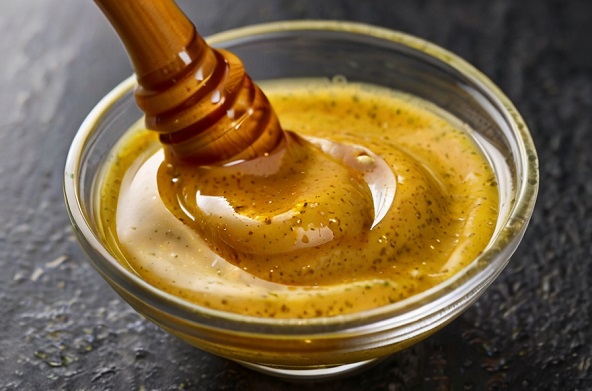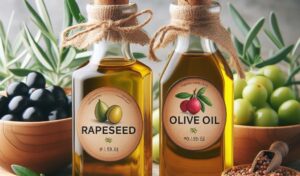You might think that honey mustard is just another sugary condiment that’s bad for your health. But hold on! There’s more to this popular sauce than you might expect. Let’s dive into is honey mustard healthy?
What is Honey Mustard?
Honey mustard is a simple yet flavorful blend of two primary ingredients: honey and mustard. Sounds basic, right? But these two ingredients come together to create a delicious sauce that’s both sweet and tangy.
Honey: This natural sweetener is packed with antioxidants and has antibacterial properties. While it’s high in sugar, it offers more nutritional benefits compared to refined sugar.
Mustard: Made from mustard seeds, this ingredient is low in calories and fat. It’s also a good source of vitamins and minerals like selenium, magnesium, and omega-3 fatty acids.
So, when you mix these two, you get a condiment that’s not only tasty but also carries some nutritional perks. Of course, the exact health benefits can vary depending on the specific recipe or brand you choose.
Types of Honey Mustard
Honey mustard isn’t one-size-fits-all. There are various types out there, each with its own twist. Here’s a quick rundown:
Store-Bought: These are the most common and convenient options. However, they can vary greatly in terms of ingredients and nutritional content. Some are loaded with preservatives and sugars, while others are more natural.
Homemade: Making honey mustard at home allows you to control the ingredients. You can opt for organic honey and mustard, and even experiment with different flavors like adding a touch of garlic or apple cider vinegar.
Organic: These options are made from organic ingredients, free from pesticides and synthetic additives. They might be a bit pricier but are often healthier.
Low-Sugar: If you’re watching your sugar intake, look for low-sugar or sugar-free versions. These are made with sugar substitutes or simply less honey.
Nutritional Information of Honey Mustard
Honey mustard can be relatively healthy if consumed in moderation. It often contains honey, mustard, and vinegar, providing some vitamins and antioxidants. However, it can also be high in sugar and calories, depending on the recipe. Opt for versions with minimal added sugars and fats for a healthier choice. Here is some information about the nutrition of honey mustard.
Calories in Honey Mustard
One of the first things people ask about any condiment is, “How many calories does it have?” Well, honey mustard can vary, but on average, a tablespoon of honey mustard dressing contains about 45-60 calories. Here’s a quick comparison:
Regular Honey Mustard: Typically around 50-60 calories per tablespoon.
Low-Calorie Versions: These can have as few as 10-20 calories per tablespoon.
So, if you’re on a diet or watching your calorie intake, opting for a low-calorie version might be a smart move.
Nutritional Value
Beyond calories, it’s essential to look at the overall nutritional value of honey mustard. Here’s a breakdown of what you might find in a typical serving:
Carbohydrates: Mostly coming from the honey, with around 5-10 grams per tablespoon.
Fat: Generally low, usually less than 1 gram per serving.
Protein: Minimal, typically less than 1 gram.
Vitamins and Minerals: Honey mustard can provide small amounts of vitamins like B6 and C, as well as minerals like calcium, iron, and potassium.
The nutritional value can vary widely between different brands and recipes. Homemade versions, for instance, can be tweaked to boost their health benefits by using ingredients like Greek yogurt instead of mayo or adding superfoods like turmeric.
Also read: Protein in Baked Beans
Health Benefits of Honey Mustard
Honey mustard isn’t just a tasty condiment, but also healthy and has some health benefits. Let’s break down what makes this sauce a potentially healthy addition to your diet.
Antioxidants and Vitamins
Honey mustard contains antioxidants and vitamins that can benefit your health.
Antioxidants: The honey in honey mustard is rich in antioxidants, which help protect your cells from damage caused by free radicals. This can reduce the risk of chronic diseases.
Vitamins: Mustard seeds are a good source of vitamins such as vitamin C, vitamin B6, and vitamin K. These vitamins are essential for maintaining a healthy immune system and overall well-being.
Adding honey mustard to your meals can give you a small boost of these beneficial nutrients, which is always a plus!
Honey Mustard and Weight Loss
You might be wondering, “Is honey mustard healthy for weight loss?” The answer is, it can be!
Low-Calorie Option: Compared to heavier dressings like ranch or blue cheese, honey mustard is relatively low in calories, especially if you opt for low-calorie versions.
Appetite Control: The sweet and tangy flavor can make healthy foods like salads and vegetables more appealing, helping you stay on track with your diet.
Of course, moderation is key. Using honey mustard as a flavorful addition rather than a main ingredient can help you enjoy its benefits without overdoing it.
Heart Health
Can honey mustard benefit your heart? Let’s find out.
Cholesterol: Some studies suggest that mustard seeds can help lower cholesterol levels, which is great for heart health.
Omega-3 Fatty Acids: Mustard seeds contain omega-3 fatty acids, which are known to support heart health by reducing inflammation and improving cholesterol levels.
So, incorporating honey mustard into your diet might contribute to a healthier heart, especially if you’re choosing versions with healthy fats and lower sodium.
Also read: Is Apple Butter Healthy
Is Honey Mustard Good for Specific Diets?
Different diets have different requirements. Let’s see how honey mustard fits into some of the most popular ones.
Honey Mustard for Diabetics
Is honey mustard healthy and a good choice for people with diabetes?
Sugar Content: While honey mustard does contain sugar from the honey, some brands offer low-sugar or sugar-free options. These can be a better choice for managing blood sugar levels.
Glycemic Index: Mustard has a low glycemic index, which means it won’t cause rapid spikes in blood sugar. Combining it with other low-GI foods can be beneficial.
Diabetics should always check the label and opt for versions with less sugar to enjoy honey mustard without compromising their health.
Gluten-Free Honey Mustard
For those with gluten sensitivities or celiac disease, gluten-free options are essential.
Gluten-Free Brands: Many brands now offer gluten-free honey mustard. These are made without any wheat or gluten-containing ingredients.
Cross-Contamination: Always check for labels that certify the product as gluten-free to avoid cross-contamination.
Choosing a gluten-free honey mustard ensures you can enjoy this tasty condiment without any adverse reactions.
Keto and Low-Carb Diets
If you’re on a keto or low-carb diet, honey mustard can still be part of your meals.
Carb Content: Traditional honey mustard can be high in carbs due to the honey. However, there are low-carb versions available that use sugar substitutes.
Keto-Friendly Options: Look for honey mustard made with keto-friendly ingredients to keep your carb count low while still enjoying the flavor.
This makes it possible to enjoy honey mustard even when you’re cutting carbs.
Vegan and Whole30 Diets
Let’s see if honey mustard fits into vegan and Whole30 diets.
Vegan: Many store-bought honey mustard dressings contain animal products. However, you can make or buy vegan honey mustard made with plant-based sweeteners.
Whole30: For those following Whole30, homemade honey mustard using compliant ingredients can be a great addition to your meals.
Making your own or choosing carefully can ensure honey mustard aligns with these dietary needs.
Also read: Is Garlic Bread Healthy?
Homemade vs. Store-Bought Honey Mustard
Now, let’s talk about the differences between homemade and store-bought honey mustard. Each has its pros and cons.
Homemade Honey Mustard
Making honey mustard at home offers several advantages.
Control Over Ingredients: When you make honey mustard at home, you control what goes into it. You can choose high-quality, organic honey and mustard, and avoid any unwanted additives or preservatives.
Healthier Options: You can tweak the recipe to make it healthier. For example, you can use less honey to reduce the sugar content or add ingredients like Greek yogurt for a creamy texture without the extra calories.
Customization: Homemade honey mustard allows you to experiment with flavors. Add a bit of garlic, apple cider vinegar, or even some herbs to create a unique taste.
Here’s a simple recipe to get you started: mix equal parts of honey and mustard, and add a splash of apple cider vinegar for some extra tang. Adjust to taste!
Best Store-Bought Brands
If you prefer the convenience of store-bought honey mustard, there are plenty of healthy options available.
Annie’s Organic Honey Mustard: This brand is known for its organic ingredients and delicious taste. It’s a great option if you’re looking for a healthier store-bought choice.
Primal Kitchen Honey Mustard Vinaigrette: Perfect for those on a keto or paleo diet, this honey mustard is made with avocado oil and is free from added sugars and artificial ingredients.
Sir Kensington’s Honey Mustard: Another excellent choice, Sir Kensington’s focuses on high-quality, non-GMO ingredients and has a rich, tangy flavor.
When choosing a store-bought option, look for honey mustard that is low in sugar and free from artificial additives. This way, you can enjoy the convenience without compromising on health.
Also read: Is Naked Juice Healthy?
Potential Side Effects of Honey Mustard
Honey mustard is tasty and can offer some health benefits, but it’s also important to be aware of any potential side effects. Let’s explore these in detail.
Allergies and Sensitivities
Honey mustard can cause allergic reactions in some people.
Mustard Allergy: Mustard is a common allergen. Symptoms of a mustard allergy can include skin rashes, itching, swelling, and in severe cases, anaphylaxis. If you know you have a mustard allergy, it’s best to avoid honey mustard entirely.
Honey Allergy: Although less common, some individuals may be allergic to honey. Symptoms might include itching, hives, swelling, and difficulty breathing.
If you have a known allergy to mustard or honey, make sure to check labels carefully or avoid honey mustard altogether to prevent allergic reactions.
Overconsumption Risks
Eating too much of any condiment can have downsides, and honey mustard is no exception.
High Sugar Content: While honey has natural sugars, it’s still sugar. Consuming large amounts can lead to weight gain, increased blood sugar levels, and potential cavities.
Sodium Levels: Some store-bought honey mustards can be high in sodium. High sodium intake can lead to increased blood pressure and other heart-related issues.
Moderation is key. Enjoy honey mustard in small amounts to add flavor without the negative side effects.
Also read: Why is Yellow Rice Healthy?
Comparing Honey Mustard with Other Dressings
Honey mustard is just one option in a sea of condiments. Let’s see how it stacks up against other popular dressings.
Honey Mustard vs. Mayo
Mayonnaise is a common condiment, but how does it compare to honey mustard in terms of health?
Calories and Fat: Mayo is much higher in calories and fat compared to honey mustard. A tablespoon of mayo has about 90 calories and 10 grams of fat, while honey mustard typically has 45-60 calories and less than 1 gram of fat.
Nutritional Value: Honey mustard offers some vitamins and antioxidants from mustard seeds and honey, which mayo lacks.
For a healthier option, honey mustard is a better choice, especially if you’re watching your calorie and fat intake.
Honey Mustard vs. Ranch
Ranch dressing is another popular choice, but how does it measure up?
Calories and Fat: Ranch is also higher in calories and fat, with about 130 calories and 14 grams of fat per tablespoon. Honey mustard is much lighter in comparison.
Ingredients: Ranch often contains more additives and preservatives, whereas you can find more natural or organic versions of honey mustard.
Honey mustard can be a healthier alternative to ranch, offering similar creaminess with fewer calories and additives.
Also read: Is Brown Rice Keto Friendly?
Additional Tips and Tricks
Let’s finish with some extra tips and tricks to get the most out of your honey mustard.
Storage Tips
Proper storage is key to maintaining the quality and taste of your honey mustard.
Refrigeration: Store honey mustard in the refrigerator after opening. This helps preserve its flavor and prevents spoilage.
Homemade Honey Mustard: If you make honey mustard at home, store it in an airtight container in the fridge. It should last for about two weeks.
Freezing: Although not common, you can freeze honey mustard. Just be sure to store it in a freezer-safe container and thaw it in the refrigerator before use.
Creative Uses
Honey mustard is more than just a salad dressing. Here are some creative ways to use it:
Marinade: Use honey mustard as a marinade for chicken, pork, or tofu. The sweet and tangy flavor can enhance the taste of your protein.
Dipping Sauce: Perfect for dipping veggies, pretzels, or even chicken nuggets. It adds a delightful flavor to snacks and appetizers.
Sandwich Spread: Swap out mayo for honey mustard on your sandwiches for a healthier, more flavorful option.
Salad Dressing: Mix honey mustard with olive oil and vinegar to create a delicious homemade salad dressing.
Glaze: Brush honey mustard on roasted vegetables or meats for a tasty glaze.
Pairing Suggestions
Wondering what pairs well with honey mustard? Here are some suggestions:
Proteins: It goes great with chicken, pork, ham, and tofu.
Vegetables: Try it with roasted Brussels sprouts, carrots, or green beans.
Snacks: Perfect with pretzels, cheese sticks, and veggie sticks.
Salads: Use it as a dressing for green salads, pasta salads, or potato salads.
By using these tips and tricks, you can make the most out of honey mustard and enjoy its flavors in various dishes.
Also read: Is Cottage Cheese Low Carb Diet or Keto Friendly?
Final Thoughts
Is honey mustard healthy? Ready to add some honey mustard to your meals? Try making your own at home for the healthiest option, or choose a low-sugar, organic store-bought brand. Experiment with different recipes and see how this tasty condiment can enhance your dishes.
Frequently Asked Questions
Here are some common questions.
Can I eat honey mustard on a keto diet?
Yes, you can enjoy honey mustard on a keto diet by choosing low-carb versions that use sugar substitutes. There are keto-friendly brands available, or you can make your own at home with keto-approved ingredients.
How should I store honey mustard?
Store honey mustard in the refrigerator after opening. Homemade honey mustard should be kept in an airtight container in the fridge and typically lasts about two weeks. You can also freeze it in a freezer-safe container and thaw in the refrigerator before use.
Is honey mustard better than mayo?
Honey mustard is generally healthier than mayo, as it’s lower in calories and fat. Mayo has about 90 calories and 10 grams of fat per tablespoon, while honey mustard typically has 45-60 calories and less than 1 gram of fat.
Can vegans eat honey mustard?
Traditional honey mustard contains honey, which is not vegan. However, there are vegan versions available that use plant-based sweeteners. Always check the label or make your own vegan honey mustard at home.

